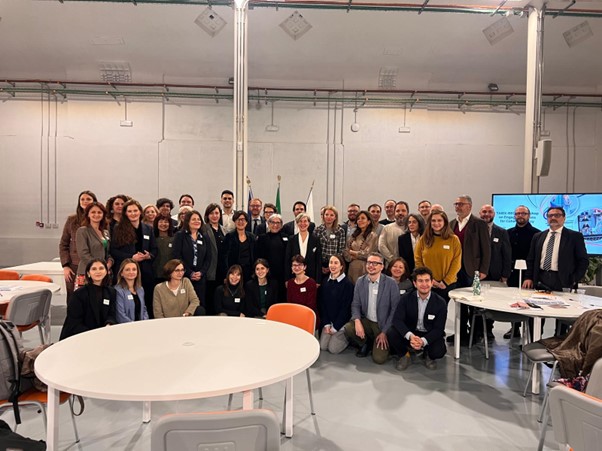“The talk of the town”: Citizen Engagement in Cohesion Policy
- 12 Feb 2025

Cohesion policy is a complicated machine, with many levels of governance from the European to the local level passing through the national level. Such a decision-making behemoth has many moving parts, and while it is the role of experts and public officials to shape it, the people who live and work in a community are the ones standing to feel the concrete effects of the policy. As a result, citizens in European cities and regions are uniquely qualified to know what is best for their region. Of course, citizens already can influence policy by actively participating in political life at every level, however, their input is what can really make a difference in the implementation of place-based policies like cohesion policy.
However, involving citizens in policymaking is no small feat—it demands navigating administrative, organisational, and legal challenges, alongside developing the capacity of civil servants and ensuring compliance with regulations.
Despite these hurdles, the commitment to involve citizens represents a long-term investment in the effectiveness of policies in answering community needs. Nevertheless, such commitment raises a vital question: what is the best way to engage citizens in crafting cohesion policy? How to best integrate their insights while navigating the complex machinery of multi-level governance?
More than one way to engage citizens
The many ways in which cohesion policy is implemented at local level give an overview of how a community can craft a bespoke approach to citizen engagement. Across Europe, many different forms of participation have taken shape. Non-formal education methods in schools, ideathons combined with public consultations and voting, citizens’ juries and commissions, research walks paired with surveys, civic lotteries, and citizens’ panels—these are just a few of the innovative methodologies being employed to enhance public engagement. Many of these approaches, along with others still in development, are applied in the implementation of programmes that are aimed at integrating territorial strategies for both urban and remote areas. They support urban investments for a Greener Europe, promote sustainable urban mobility, and contribute to cultural initiatives, infrastructure projects, and participatory budgeting processes.
For instance, the Normandy region, alongside the CSO Relais Culture Europe involves citizens in a deliberative process on the role of cultural spaces as facilitators for citizens’ creativity.
In Poland, the Silesian Voivodeship is creating the space and the capacities to embed citizen participation in the infrastructure projects funded through Cohesion Policy (ERDF/JTF). As Barbara Szafir from the Voivodeship Marshal's Office says "We actively listen to key stakeholders in the territory to involve them in defining the regional innovation strategy. This process includes planning concrete activities, and implementing infrastructure projects, with regular monitoring points".
It does not stop here, as models and applications for citizen involvement are legion across the EU. The Italian region of Lazio is testing civic monitoring on territorial strategies in the municipalities of Rieti, Latina, Frosinone and Viterbo. "Our idea is to select [ERDF] projects and build a community around them to work together and define them in detail, collecting data and directly involving the relevant policymakers for communities", says Luigi Reggi from Monithon about their approach.
“Parlem de pressupostos” (Let’s Talk About Budgeting) is an innovative citizen participation initiative by the Generalitat of Catalunya, designed to gather insights from citizens, as well as social and territorial stakeholders, on their preferences and priorities for budgetary policies. The goal is to integrate these perspectives into the budgetary cycle, ensuring policies reflect the needs of the community. Xavier Mestre, representing the Generalitat, emphasised the broader impact of such initiatives: “Participatory spaces enhance trust in public institutions. This is not just a consultation—it’s an opportunity to empower citizens and foster long-term engagement. Our aim is to cultivate a culture of participation through education and initiatives that inspire young people to get involved.”
The Brussels Capital Region and Metrolab are redefining urban development by putting citizens at the heart of the process. Through innovative tools for co-design and inclusion, they’re steering ERDF projects toward greater impact. As Mathieu Berger from Metrolab puts it: "Participation corrects inequality in the region and is a way to upscale and align projects with larger, more strategic initiatives. The challenge is to increase knowledge within the population, and improve the expertise and quality of the projects".
A place to exchange
All of these methods, along with many others were in the spotlight in Bologna last November at the multi-country TAIEX-REGIO workshop at the Tecnopolo Manifattura | Data Valley Hub.
The hub for the Emilia Romagna region innovation eco-system provided the inspiration for new ways of building relations with citizens. Representatives from public authorities and civil society organisations from Belgium, France, Italy, Poland, Romania, Slovakia, and Spain met to focus on partnership and the role of citizens in cohesion policy.
Emilia Romagna also showcased the involvement of high-school students’ assemblies in the implementation of EU-funded projects within the Strategies for Inner and Mountain Area. Sofia Galli, from the organisation Bangherang, pointed out that "Young people perspectives offer us a different vision for the future".
This feeling compounds José Carlos Ceballos’ from Centro Internacional Santander Emprendimiento, who remarked that the project takes place "a critical moment for Europe, marked by a disconnection between citizens and public policy, making it essential to rebuild a strong connection between people and the management of public policy".
Ultimately, the workshop was an opportunity to discuss both the benefits of participative processes and their challenges.
These challenges are administrative, organisational and legal. Implementation of participative processes are realised through time-consuming administrative procedures and procurement, e.g. logistic and recruitment of experts for facilitation of citizens panels. Implementation not only requires dedicated budget but also an active role of civil servants, which not always already dispose of the necessary competences and skills.
Therefore, political support and legal certainty about the impact of citizens recommendation would help public administration to overcome difficulties, plan learning of new skills, and reengineer operational processes.
As remarked by OECD David Goessmann, at the end of the workshop, the potential of citizens’ input is something that public administration must learn to tap at different levels of governance. Bologna deputy mayor Anna Lisa Boni recalled that "A contract with citizens means more than just getting people involved. It's about giving them responsibility and making them partners in shaping policies".
This approach is what lead also the Emilia-Romagna region to stipulate a collaborative approach with citizens in policy-making already in 2018. Assisting in the mainstreaming of such practices, the European Commission developed two key instruments: the European citizens panels and a multilingual platform.
The workshop concluded with a hopeful look towards the future and in particular to the ways in which technological innovations can help in bridging the gap between citizens and public administrations as one OECD expert said, “[a technology like] artificial intelligence can empower citizens in navigating government complexity and support them in participating processes, but also expand government capacity to listen to citizen voices".
More information
Additional Information
(presentations, videos, pictures from the workshop are available here)
Collection of articles by OECD experts on some of the projects from the cooperation between OECD and European Commission to promote citizens participation in EU cohesion policy:


